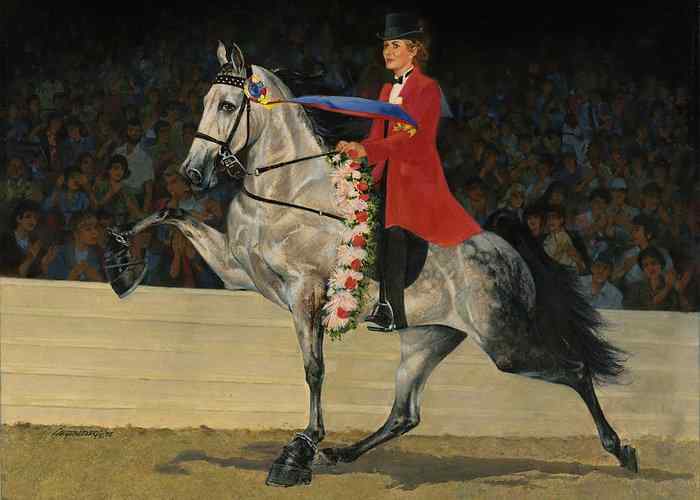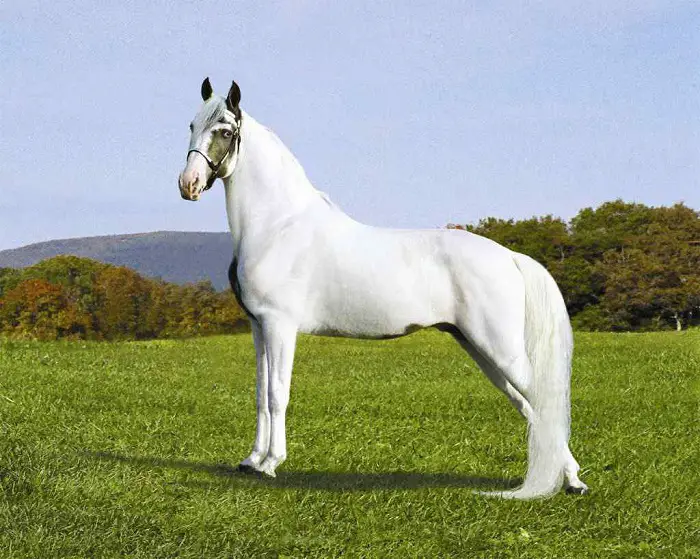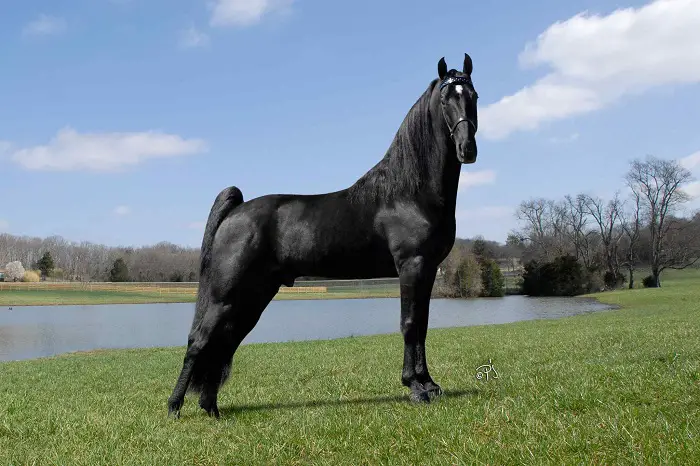Tennessee Walking Horse is generally considered to be an intelligent animal. Like many horse breeds, they possess a certain level of intelligence and can be trained to perform various tasks. However, it’s important to note that individual horses may vary in their intelligence and temperament, regardless of their breed.
Tennessee Walking horses are famous for their smooth, distinctive gait called the “running walk,” which is natural for them. They are often used for pleasure riding, trail riding, and showing. These horses are typically known for their calm and willing nature, which can make them relatively easy to train.
Origin and History of Tennessee Walking Horse
The Tennessee Walking Horse is a breed that originated in the southern part of the United States of America, specifically in Tennessee. Its history dates back to the late 18th century and early 19th century when various horse breeds were brought to the region.
The exact lineage of the Tennessee Walking Horse needs to be clarified. Still, it is believed to have been influenced by several horse breeds, including the Narragansett Pacer, Canadian Pacer, Thoroughbred, Morgan, and American Saddlebred. The goal was to develop a versatile and smooth-gaited horse that would be well-suited for plantation owners and farmers.
Over time, a distinctive gait known as the “running walk” became a defining characteristic of the breed. The running walk is a four-beat gait that is both comfortable and efficient, allowing the rider to cover long distances while maintaining a smooth ride. This smooth gait made the Tennessee Walking Horse highly desirable for various purposes, including plantation work, transportation, and leisure riding.
In the early 20th century, the Tennessee Walking Horse gained recognition as a distinct breed. In 1935, the Tennessee Walking Horse Breeders’ Association (now known as the Tennessee Walking Horse Breeders’ and Exhibitors’ Association, or TWHBEA) was established to promote and preserve the breed. The association developed breed standards and worked to ensure the integrity of the breed’s bloodlines.
Tennessee Walking Horses gained popularity in the United States and internationally. They became sought after for their smooth gait, gentle temperament, and versatility. They were used in various equestrian disciplines, including pleasure riding, trail riding, and horse shows.
Physical Features of Tennessee Walking Horse
The Tennessee Walking Horse is a medium to large-sized breed with distinctive physical features contributing to its unique gait and overall appearance. Here are some notable characteristics of the Tennessee Walking Horse:
- Size: Tennessee Walking Horses are typically between 14.3 and 17 hands high (59 to 68 inches or 150 to 173 cm at the withers). They have a well-balanced and muscular build.
- Body: The body of a Tennessee Walking Horse is compact and well-proportioned. They have a deep chest, strong shoulders, a short back, and a sloping croup. The overall body structure is designed to provide strength, endurance, and balance.
- Head: The head of a Tennessee Walking Horse is well-shaped with a straight or slightly concave profile. They have expressive eyes, a broad forehead, and medium-sized ears.
- Neck: The neck of a Tennessee Walking Horse is arched, well-muscled, and of medium length. It blends smoothly into the shoulders and provides an elegant and balanced appearance.
- Gait: One of the most distinctive features of the Tennessee Walking Horse is its unique gait called the “running walk.” This four-beat gait is smooth, purposeful, and free-flowing. The front foot strikes the ground first, followed by the opposite hind foot, creating a gliding motion. The horse’s head nods in rhythm with the gait.
- Legs and Feet: Tennessee Walking Horses have strong, well-boned legs and clean joints. They have long, sloping pasterns that contribute to the smoothness of their gait. The hooves are typically well-formed and sturdy.
- Coat: The Tennessee Walking Horse comes in various solid colors, including bay, chestnut, black, and gray. They can also have white markings on the face and legs. The coat is usually short and sleek.
Height and Weight of Tennessee Walker
The Tennessee Walking Horse is generally a medium to large-sized breed with variations in height and weight. Here are some average ranges for the height and weight of Tennessee Walking Horses:
Height:
- The height of Tennessee Walking Horses typically ranges from 14.3 to 17 hands high (59 to 68 inches or 150 to 173 cm) at the withers.
- “Hands” is a traditional unit of measurement in the equestrian world, where one hand is equal to approximately 4 inches or 10.16 cm.
Weight:
- The weight of Tennessee Walking Horses can vary depending on factors such as height, build, and overall condition.
- Adult Tennessee Walking Horses weigh between 900 and 1,200 pounds (410 to 545 kg).
Color and Markings of Tennessee Walking Horse
Tennessee Walking Horses come in various colors and can display various markings. Here are some of the standard colors and markings seen in the breed:
Colors:
- Bay: Bay is a common color in Tennessee Walking Horses. It ranges from light reddish-brown to dark brown with black points (mane, tail, and lower legs).
- Chestnut/Sorrel: Chestnut or sorrel is reddish or coppery coat color. It can vary from light to dark shades.
- Black: Black Tennessee Walking Horses have a solid black coat throughout their body. Some may have small white markings on the face or legs.
- Gray: Gray horses have a coat that lightens over time, with a mix of white and dark hairs. They are born with a different base color (black, bay, or chestnut) and gradually develop gray hair as they age.
- Other Colors: Tennessee Walking Horses can also come in less common colors, including palomino (golden coat with a white mane and tail), buckskin (tan or yellowish coat with a black mane and tail), and roan (a mixture of colored and white hairs).
Markings:
- Star: A star is a small white mark on the horse’s forehead, typically in the shape of a dot or a small irregular patch.
- Stripe: A stripe is a little white mark that runs vertically down the center of the horse’s face, starting between the eyes and ending at or below the level of the nostrils.
- Snip: A snip is a small white mark on the horse’s muzzle, often between the nostrils.
- Blaze: A blaze is a broad white mark that extends down the horse’s face, often covering the forehead and reaching or extending beyond the nostrils.
- Socks/Stockings: Socks are white markings on the lower legs, typically extending from the hoof to various heights. Stockings are white markings that reach higher, covering most of the lower leg.
The Behavior of Tennessee Walking
The behavior of Tennessee Walking Horses can be influenced by various factors, including their genetics, individual temperament, training, and handling. Here are some general behavioral characteristics often associated with Tennessee Walking Horses:
- Gentle and Calm: Tennessee Walking Horses are known for their gentle and calm temperament. They tend to be willing and friendly, making them well-suited for riders of different skill levels, including novice riders and children.
- Intelligent: Tennessee Walking Horses are generally considered to be intelligent animals. They are quick learners and can adapt well to training and new situations. Their intelligence often makes them responsive to cues and aids from their riders or handlers.
- Versatile: Tennessee Walking Horses are known for their versatility. They can excel in various equestrian disciplines, including pleasure, trail, endurance, and horse shows. Their smooth gait, athleticism, and willingness to work allow them to perform well in different settings.
- Smooth Gait: The Tennessee Walking Horse’s signature gait, the running walk, is naturally smooth and comfortable. This gait is four-beat and unique to the breed. It provides riders with a gliding motion and minimal bounce, making it an enjoyable and less jarring experience for long rides or extended periods of riding.
- Bonding and Connection: Tennessee Walking horses are known for building strong relationships with their owners or riders. They often respond to kind and consistent training methods and can develop a close relationship with their handlers.
- Sensitivity: Tennessee Walking horses can be physically and emotionally sensitive animals. They can be responsive to subtle cues and may require gentle handling and clear communication from their riders or handlers. Creating a positive and encouraging environment for them to thrive is essential.
Feed and Nutrition of Tennessee Walker
Proper feed and nutrition are essential for maintaining the health and well-being of Tennessee Walking Horses. Here are some key considerations regarding their feed and nutrition:
- Forage: Tennessee Walking Horses, like most horses, have a natural grazing behavior and require access to good-quality forage. Pasture turnout or free-choice access to hay is essential for their digestive health. Providing ample grazing time or feeding them hay helps meet their fiber requirements.
- Hay: High-quality grass hay, such as timothy orchard grass, is generally suitable for Tennessee Walking Horses. The hay should be clean and free from dust, mold, or other contaminants. The amount of hay needed can vary depending on factors such as the horse’s weight, age, and activity level, but a general guideline is to provide around 1.5 to 2% of their body weight in forage per day.
- Concentrates: Besides forage, Tennessee Walking Horses may require concentrates or grain-based feeds to meet their energy and nutrient needs, especially if they have high activity levels or specific performance requirements. The specific type and amount of concentrates should be determined based on the horse’s needs, considering age, weight, workload, and overall body condition. It’s essential to consult a veterinarian or equine nutritionist to develop an appropriate feeding plan.
- Balanced Diet: Tennessee Walking Horses, like all horses, require a balanced and healthy diet that includes protein, carbohydrates, fats, vitamins, and minerals. Commercially formulated horse feeds or supplements can help ensure they receive the necessary nutrients. These feeds should be specifically designed for horses and meet their nutritional requirements. Again, consulting with an equine nutritionist can help determine your horse’s most suitable feed options.
- Hydration: Access to clean, fresh water is crucial for Tennessee Walking Horses. They should have a constant water supply in their pasture and stalls or paddocks. Regularly monitor water sources to ensure cleanliness and availability.
- Feeding Schedule: Establish a consistent feeding schedule for your Tennessee Walking Horse. Horses generally thrive on regularity, and feeding them at consistent times can help maintain their digestive health and reduce stress.
Care and Management of Tennessee Walking Horse
Proper care and management are essential for Tennessee Walking Horses’ health, well-being, and performance. Here are some key aspects to consider:
- Shelter: Provide appropriate shelter for your Tennessee Walking Horse. A well-ventilated and weatherproof barn or run-in shed can protect them from extreme weather conditions such as excessive heat, cold, rain, or snow.
- Pasture and Exercise: Allow your horse regular access to safe and suitable pastures for grazing and exercise. If pasture turnout is not available or limited, provide ample daily turnout in a paddock or an arena to allow for movement and social interaction.
- Grooming: Regular grooming helps maintain the health and cleanliness of your Tennessee Walking Horse. Brush their coat to remove dirt, debris, and loose hair. Check their hooves daily for signs of damage, and clean them as needed. Pay attention to their mane, tail, and feathers, if present, to prevent tangling and to keep them free of debris.
- Hoof Care: Regular hoof care is crucial. Schedule routine visits from a professional farrier to trim and maintain proper hoof health. This helps prevent common hoof issues and ensures soundness and balance in the horse’s gait.
- Veterinary Care: Schedule regular veterinary check-ups for your Tennessee Walking Horse to monitor their overall health, vaccinate against diseases, and address any health concerns promptly. Follow recommended deworming protocols and maintain a good parasite control program.
- Dental Care: Regular dental examinations and floating (smoothing the horse’s teeth) are necessary to ensure proper chewing and digestion. Schedule dental check-ups with an equine dentist or veterinarian to address any dental issues.
- Training and Exercise: Provide consistent and appropriate training and exercise for your Tennessee Walking Horse. Regular exercise helps maintain their physical fitness and mental well-being. Engage in activities that suit their abilities and interests, such as trail riding, flatwork, or other equestrian disciplines.
- Socialization: Horses are social animals and benefit from interactions with other horses. Whenever possible, provide opportunities for your Tennessee Walking Horse to interact with compatible equine companions through pasture turnout or supervised socialization.
- Regular Monitoring: Daily, observe your horse’s behavior, appetite, and overall well-being. Monitor for any signs of injury, illness, or changes in behavior. Early detection of issues allows for timely intervention and treatment.
- Positive Environment: Create a positive and stress-free environment for your Tennessee Walking Horse. Provide ample access to fresh water, good-quality forage, and a balanced diet. Maintain a consistent routine and use positive reinforcement-based training methods.
The Health of Tennessee Walker
Tennessee Walking Horses are susceptible to various health issues like all horse breeds. Proper care, preventive measures, and regular veterinary check-ups are essential for continuing the health and well-being of Tennessee Walking Horses. Here are some common health considerations for the breed:
- Lameness: Tennessee Walking Horses are known for their unique gait, and lameness issues can affect their ability to perform the running walk or other gaits. Various factors, including hoof problems, improper shoeing, injuries, arthritis, or joint issues, can cause lameness. Regular hoof care, proper shoeing, and prompt veterinary attention to lameness issues are crucial.
- Hoof Problems: Hoof-related issues, such as hoof abscesses, laminitis, or cracks, can occur in Tennessee Walking Horses. Regular hoof care, including proper trimming and shoeing, a balanced diet, and appropriate exercise, can help maintain healthy hooves.
- Equine Metabolic Syndrome (EMS): Some Tennessee Walking Horses may be prone to metabolic disorders such as EMS, which can lead to obesity, insulin resistance, and laminitis. Proper nutrition management, including a balanced diet, regular exercise, and weight monitoring, is vital to prevent or manage EMS.
- Gastrointestinal Issues: Like all horses, Tennessee Walking Horses are susceptible to gastrointestinal problems such as colic, gastric ulcers, and intestinal impactions. A consistent and balanced diet, access to clean water, regular forage, and proper deworming protocols are essential for maintaining a healthy digestive system.
- Respiratory Conditions: Respiratory issues, such as allergies, recurrent airway obstruction (RAO), or heaves, can affect Tennessee Walking Horses. Maintaining good ventilation in stables, minimizing exposure to dusty environments, and providing clean bedding can help reduce the risk of respiratory problems. Proper hay and feed storage management can also minimize the risk of mold and dust inhalation.
- Dental Issues: Regular dental examinations and floating (smoothing the teeth) are essential to prevent dental problems such as sharp points or malocclusions, which can affect chewing and digestion. Dental care should be included in the routine veterinary check-ups for Tennessee Walking Horses.
- Parasite Control: Implementing a regular deworming program based on veterinary recommendations is crucial to control internal parasites and maintaining the horse’s overall health. Fecal egg counts can help determine the appropriate deworming schedule for individual horses.
Uses of Tennessee Walking Horse
Tennessee Walking Horses are versatile and can be used in various equestrian activities. The versatile uses of Tennessee Walking Horses:
- Pleasure Riding: Tennessee Walking Horses are popular choices for pleasure riding due to their smooth and comfortable gaits. They provide a relaxed and enjoyable riding experience, making them suitable for riders of different skill levels.
- Trail Riding: Tennessee Walking Horses excel in trail riding. Their smooth gait, stamina, and surefootedness make them well-suited for navigating different terrains, including rough or challenging trails. They are known for their ability to cover long distances comfortably.
- Competitive Trail Riding: Tennessee Walking Horses can participate in competitive trail riding events, where horse and rider teams complete a designated trail course within a specified time. These events test the horse’s endurance, obedience, and ability to negotiate obstacles.
- Endurance Riding: Tennessee Walking Horses can also be involved in endurance riding, which involves long-distance rides over varying terrain. Their natural smooth gait and stamina can make them suitable for endurance events that require covering distances of 50 miles or more.
- Show Competitions: Tennessee Walking Horses are commonly seen in horse shows that feature gaited breeds, such as the Tennessee Walking Horse shows. They can participate in various classes, showcasing their natural gaits and elegance. Tennessee Walking Horses are known for their striking presence in the show ring.
- Equine Therapy: Tennessee Walking Horses’ gentle and calm temperament suits them for equine-assisted therapy programs. They can provide emotional and physical support to individuals with disabilities or those undergoing therapeutic interventions.
- Ranch Work: Tennessee Walking Horses can be used for ranch work, such as herding cattle or performing other tasks on the farm. Their versatility, intelligence, and willingness to work make them valuable assets for ranchers.
- Competitive Riding: Tennessee Walking Horses can participate in competitive disciplines such as dressage or western dressage. Their natural gait and ability to perform collected and extended gaits suit these disciplines.
Tennessee Walking Horse for Sale
I apologize, but as an AI language model, I don’t have real-time access to current listings or information about specific horses for sale. To find Tennessee Walking Horses for sale, you can consider the following options:
- Online Horse Sales Websites: Various websites like Equine.com, Horseclicks.com, and DreamHorse.com list horses for sale. These platforms allow you to search for Tennessee Walking Horses based on criteria such as location, price range, age, and training level.
- Breed Associations: Contacting breed associations specific to Tennessee Walking Horses, such as the Tennessee Walking Horse Breeders’ and Exhibitors’ Association (TWHBEA), can provide information about breeders, trainers, and sales listings.
- Local Horse Classifieds: Check local equestrian publications or online classified websites that cater to your region. These sources may have listings for Tennessee Walking Horses available for sale within your area.
- Horse Auctions and Events: Attend horse auctions, sales, or breed-specific events where Tennessee Walking Horses may be sold. These events often allow seeing multiple horses and interacting with sellers directly.
- Networking: Reach out to local horse enthusiasts, trainers, or breeders who may have knowledge of Tennessee Walking Horses available for sale or can connect you with potential sellers.
Final Talk on Tennessee Walking Horse
The Tennessee Walking Horse is a remarkable breed known for its unique and smooth gaits, gentle temperament, and versatility. Whether you’re seeking a pleasurable trail companion, a competitive show horse, or a reliable partner for various equestrian activities, the Tennessee Walking Horse offers a range of possibilities.
Their signature running walk, a four-beat gait with a gliding motion, provides a comfortable and enjoyable riding experience. This smoothness, combined with their intelligence and willingness to please, makes them popular for riders of all skill levels.
Beyond their distinctive gaits, Tennessee Walking Horses are recognized for their calm and friendly nature. They often form strong bonds with their owners and can adapt well to different training techniques and environments. These horses are known for versatility and can excel in various disciplines, from pleasure and trail riding to competitive events and therapeutic programs.
The Tennessee Walking Horse embodies beauty, athleticism, and a smooth gait that captivates riders worldwide. Whether you’re riding for pleasure, competing in shows, or seeking a reliable companion, the Tennessee Walking Horse offers an exceptional equestrian experience.



